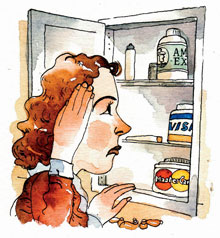6 Common Shopping Traps—And How to Avoid Them
3. Cash and Carry

Illustration: Barry Blitt
PAGE 2
If paying for goods causes pain in the brain, credit cards are aspirin. Unfortunately, cards also create bigger headaches later on. "When you pay in cash, you see your wallet getting thinner," says Dan Ariely, PhD, professor of behavioral economics at Duke University. But when you use a credit card, the spending is abstract, "and that makes you trigger-happy." In one experiment at MIT, subjects were asked to bid on tickets to a sold-out Boston Celtics game. Half were told to pay with cash; the other half could use credit cards. "There's some evidence that the enjoyable experience of acquiring things has been paired with the touch and feel of the plastic, says study leader Drazen Prelec, PhD, professor of management science at MIT. "It's almost like smelling food when you're hungry. Shockingly, we found that bids were twice as high among the group that thought they would use credit cards."
Using cash is the number one antidote to overspending, according to experts. If you do pay with a credit card, beware of the trap "I've already got this debt, so it won't matter if I pile on more." Prelec compares it to the diet-blowing excuse "I ate one piece, so I may as well eat the whole cake."
4. A Bad Mood Can Cost You
That's what new research suggests. Jennifer Lerner, PhD, director of the Emotion and Decision Making Group at Harvard's John F. Kennedy School of Government, had participants view either a sad video (a clip from The Champ, in which a boy cries at the side of his dying father) or an emotionally neutral one (about the Great Barrier Reef). Afterward, she asked how much they'd be willing to spend on a sporty water bottle. Those who watched the poignant film offered almost 300 percent more. Sadness devalues one's sense of self, explains Lerner. The urge to pay more may be an attempt to elevate your own worth.



